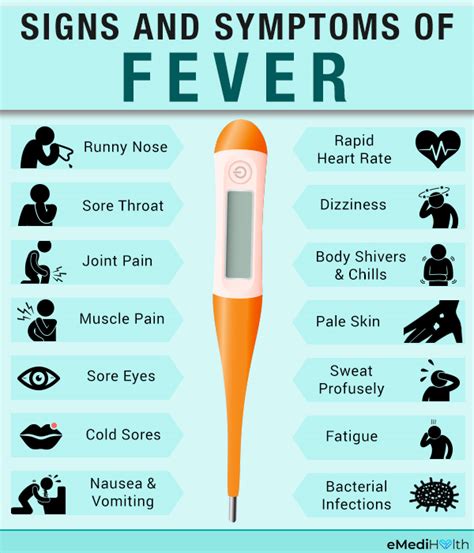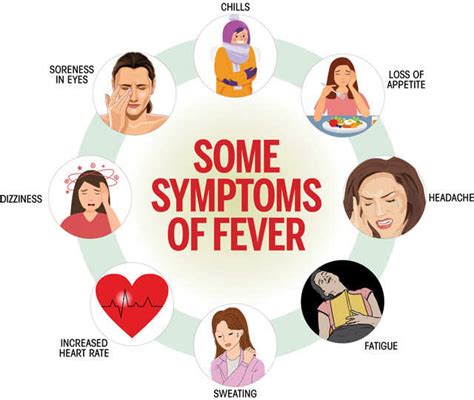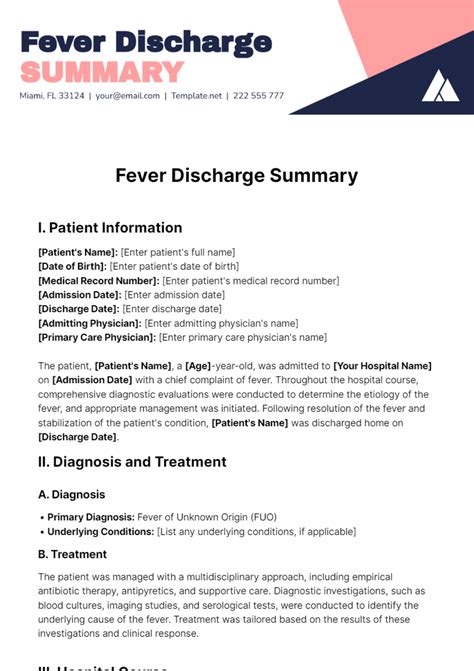Intro
Learn high fever symptoms, treatment, and management. Discover causes, home remedies, and medications to reduce temperature, alleviating headaches, body aches, and fatigue.
High fever is a common health issue that affects people of all ages, and it can be caused by a variety of factors, including infections, inflammation, and other medical conditions. Fever is a natural response of the body's immune system to fight off infections and diseases, but when it becomes too high, it can be a cause for concern. In this article, we will delve into the symptoms and treatment of high fever, and provide you with the necessary information to manage and prevent it.
High fever can be uncomfortable and even life-threatening if left untreated. It can cause a range of symptoms, including headaches, body aches, chills, and sweating. In severe cases, high fever can lead to dehydration, seizures, and even organ damage. Therefore, it is essential to recognize the symptoms of high fever and seek medical attention if necessary.
The symptoms of high fever can vary depending on the underlying cause, but common symptoms include a body temperature above 103°F (39.4°C), sweating, chills, headaches, body aches, and fatigue. In some cases, high fever can also cause confusion, disorientation, and seizures, especially in young children and older adults. If you or someone you know is experiencing any of these symptoms, it is crucial to seek medical attention immediately.
What Causes High Fever

It is essential to identify the underlying cause of high fever to provide effective treatment. A healthcare professional can diagnose the cause of high fever by performing a physical examination, taking a medical history, and ordering diagnostic tests, such as blood tests and imaging studies.
Types of Fever
High fever can be classified into different types, depending on the duration and severity of the fever. Some common types of fever include: * Acute fever: lasts for a short period, usually less than a week * Subacute fever: lasts for several weeks * Chronic fever: lasts for several months or years * Remittent fever: fluctuates between normal and high temperatures * Relapsing fever: recurs at regular intervalsSymptoms of High Fever

In some cases, high fever can also cause additional symptoms, such as:
- Nausea and vomiting
- Diarrhea
- Abdominal pain
- Cough
- Sore throat
When to Seek Medical Attention
If you or someone you know is experiencing any of the following symptoms, seek medical attention immediately: * Body temperature above 103°F (39.4°C) * Severe headaches * Stiff neck * Confusion * Disorientation * Seizures * Difficulty breathing * Chest painTreatment of High Fever

In some cases, hospitalization may be necessary to provide supportive care and monitor the patient's condition.
Home Remedies for High Fever
Some home remedies can help to reduce fever and relieve symptoms, including: * Drinking plenty of fluids to stay hydrated * Taking cool baths or using cool compresses to reduce body temperature * Wearing light clothing to stay cool * Getting plenty of rest to help the body recover * Avoiding strenuous activities to reduce stress on the bodyPrevention of High Fever

Complications of High Fever
If left untreated, high fever can lead to complications, including: * Dehydration * Seizures * Organ damage * Brain damage * DeathTherefore, it is essential to seek medical attention immediately if you or someone you know is experiencing symptoms of high fever.
Conclusion and Final Thoughts

We invite you to share your thoughts and experiences with high fever in the comments section below. Have you or someone you know experienced high fever? What steps did you take to manage the symptoms and prevent complications? Share your story and help others who may be going through a similar experience.
What is the normal body temperature range?
+The normal body temperature range is between 97.7°F (36.5°C) and 99.5°F (37.5°C).
How can I reduce fever at home?
+You can reduce fever at home by drinking plenty of fluids, taking cool baths, and using cool compresses.
When should I seek medical attention for high fever?
+You should seek medical attention immediately if you or someone you know is experiencing a body temperature above 103°F (39.4°C), severe headaches, stiff neck, confusion, disorientation, seizures, difficulty breathing, or chest pain.
Can high fever be prevented?
+Yes, high fever can be prevented by practicing good hygiene, getting vaccinated against infectious diseases, avoiding close contact with people who are sick, staying hydrated, and getting plenty of rest.
What are the complications of high fever?
+The complications of high fever include dehydration, seizures, organ damage, brain damage, and death.
